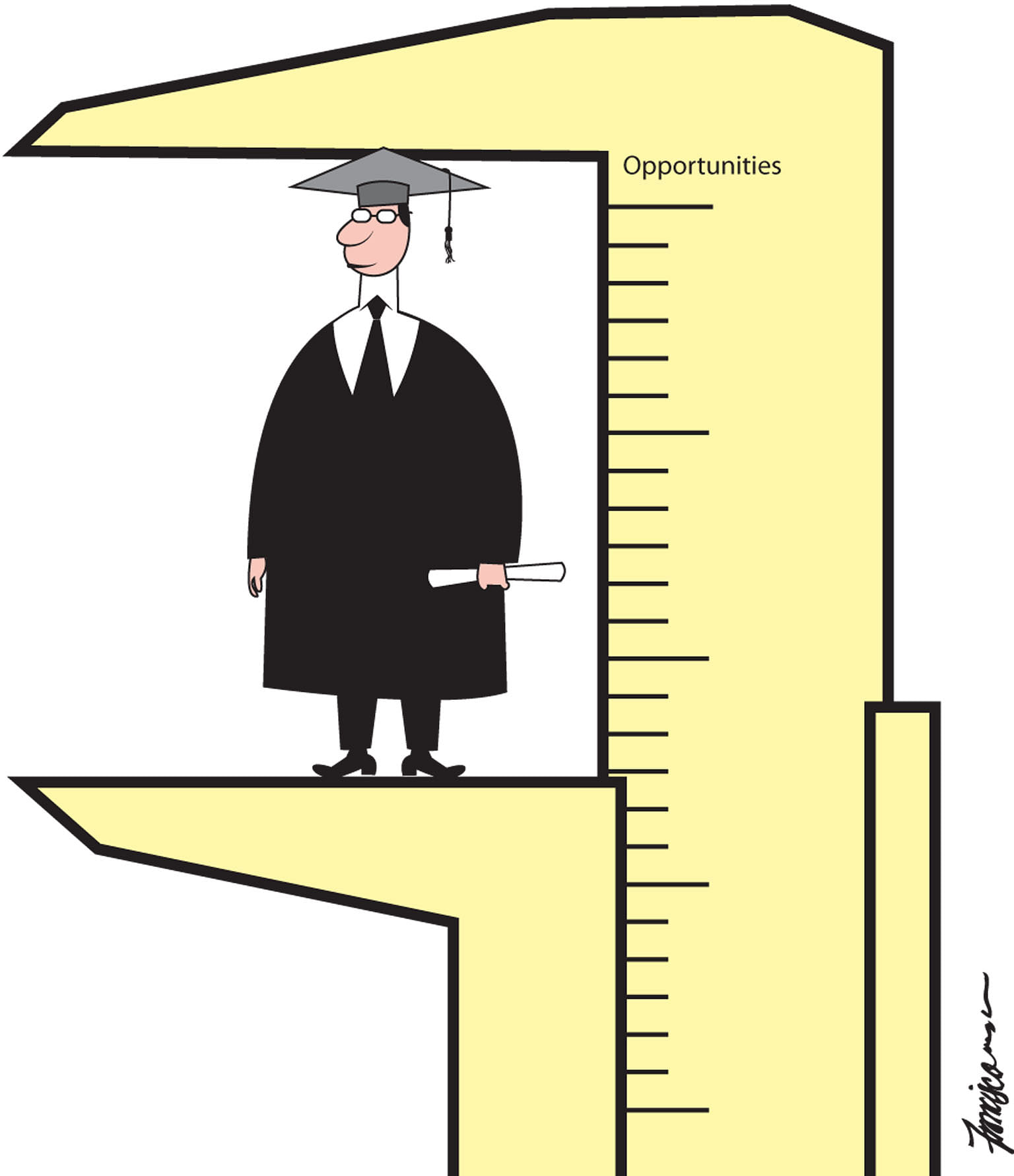The 70,000 Singaporeans enrolled in private schools were given a reality check last week, when the Government released the job outcomes of those who take that route to a degree.
The survey results from the Council for Private Education (CPE), which regulates the industry, showed that private school graduates find it harder to land jobs than their peers from public universities. Not only that, but on average, they also receive lower starting salaries.
Some 4,200 fresh graduates with degrees from nine private schools in 2014 were surveyed. Only 58 per cent found full-time jobs within six months of completing their studies. Another 21 per cent managed to find only part-time or contract work. Those surveyed, similar to most public university graduates, had no prior work experience.
The median starting salary of those with full-time jobs was $2,700 a month.
This compares poorly with the 83 per cent full-time job rate and $3,200 median gross monthly salary of graduates from three public universities - the National University of Singapore (NUS), Nanyang Technological University (NTU) and Singapore Management University (SMU) - for the same period.
If those in part-time work were included, then the job rate for NUS, NTU and SMU graduates went up to 89 per cent.
The survey results put the spotlight on two related issues.

Firstly, and especially given the dismal findings, analysis must go beyond the headline, sweeping results. Were they skewed because of lumping together schools of varying quality?
Secondly, this gives added urgency for the need to establish just who attends these private institutions. This will help to show if they have chosen the right education pathways for them to get a job.
SCHOOLS OF VARYING QUALITY
Considering that there are over 70,000 Singaporeans and 30,000 foreigners enrolled in these schools, the CPE should commit itself to conducting a yearly survey, or at least require the schools to conduct the surveys and make the results available online. Currently, it has said only that it is looking at conducting a similar survey yearly. It has also said that it is considering providing more "granular data" - very detailed data - to help students make more informed decisions before enrolling in private schools.
For starters, the analysis of data could delve a lot deeper, individually. Some of the more established players have pointed out that the schools should not be lumped together when considering employment rates for the sector, as the 300 registered private schools are of varying quality.
The CPE survey itself, in addition to the more established players such as the Singapore Institute of Management (SIM) and James Cook University Singapore, included ITC School of Laws and Trent Global College of Technology and Management. So clearly, the players brought up a valid point.
Indeed, SIM private education arm's own survey for its class of 2014, for example, found that 73 per cent of its graduates had full-time jobs within six months. (This arm runs degree courses in partnership with foreign universities.)
More than half of those surveyed had two or more job offers. It also reported an average gross monthly pay of $2,766 for graduates with full-time jobs, compared with the CPE survey's $2,700.
To ensure that its employment data is comparable to the public universities, SIM used the same format as they did.
SIM's private education arm, which has an enrolment of 20,000 students of whom 16,400 are locals, stressed that the employability of its graduates is a priority and listed measures to enhance this. For example, it provides career counselling and internship opportunities.
As for the CPE survey, as it put all the nine schools together, there is no way to assess their job market outcomes on an individual basis. But all is not lost. According to some of the private school officials, CPE does have the graduate employment outcomes for each of the nine schools, and had promised to release their individual results to them.
If so, besides providing the overall results, then the CPE should have also published the individual results of the schools, or at least have informed the public that more detailed information is available.
It would be up to the schools to release the data. If they don't - well then, students and parents can draw their own conclusions.
MAKING INFORMED CHOICES
Private schools should also look at providing job and salary data on the different degree courses they run.
Take the business degree courses that many private schools offer with overseas university partners of varying stature.
Students who fail to get into the competitive business courses at local universities have, in recent years, turned to private schools. Obviously, it would be helpful if they could access information on what the job prospects are for the different courses, the kind of jobs graduates enter and the salaries they would make.
Apparently, this is not such a straightforward request. Some of the private schools have a large number of working adults pursuing degrees part-time - and claim there is no point providing employment or salary data as their students are already in the workforce.
If that is the case, look at how business schools survey their full-time and executive MBA students, who tend to be mid-level executives.
The schools compare the salaries of the students before and after they complete the course, to show how the courses can boost their career prospects. The rankings of business schools take into account how much they boost the earning power of their graduates.
With the data, working adults are able to gauge if taking up the course is a worthwhile investment of their time and money.
Mr Ong Ye Kung, Acting Minister for Education (Higher Education and Skills), made an important point last week when referring to the CPE survey results. He reminded school-leavers they should not pursue a degree simply because it is the default pathway, as there are other pathways available to attain career success.
He highlighted the Earn and Learn scheme, where graduates from polytechnics and the Institute of Technical Education can work and further their qualifications, and the continuing education courses being mounted by the universities for working adults.
I have said before, and it bears repeating, that the CPE needs to look at who are the Singaporeans attending these schools.
It needs to understand what their reasons are for taking the private education route.
Anecdotally, many come from humble backgrounds and have not had the opportunity to go to a polytechnic or university. The CPE could look into providing education and career counselling for them, as they need more information on the pathways available.
Right now, many of the students who pick a private school, base their choice on the fees and length of the course. They also pick courses without considering if that is where their strengths and interests lie.
Some would be better off being routed into the Government's Earn and Learn scheme highlighted by Mr Ong.
Despite the dismal overall results in the CPE survey, individual data on the nine schools would have separated the wheat from the chaff. One must keep in mind that a fair number of the private school students had probably failed to qualify for the local universities. Yet, in three or four years, schools like SIM are able to deliver fairly good job outcomes to them.
The Government should look at how some of the better-quality private schools like SIM can be roped into the SkillsFuture movement, to encourage Singaporeans to build up job-relevant qualifications and skills, whatever their education pathway.


